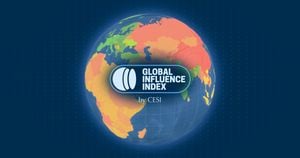The relationship between the United States and Canada has grown increasingly tense during President Donald Trump's administration, painting a troubling picture for these two closely connected nations. What was once characterized by mutual respect and cooperation has now devolved due to various contentious trade policies and personal attacks, particularly after Trump's second term began, which saw the stakes raised significantly.
At the heart of the strain lies the imposition of sweeping tariffs on Canadian goods, which many believe threaten not only the economic stability of Canada but also the longstanding camaraderie between the two nations. The relationship has been evidenced, at least partly, through cultural expressions during high-profile sports events, such as the recent 4 Nations Cup hockey game.
Fans tuning in saw not just the contest but also the underlying emotions stemming from national pride and dissatisfaction with the U.S. administration. During these matches, Canadian fans made their feelings known, booing the U.S. national anthem—a symbolic act of defiance signaling their growing frustrations.
Canadian Prime Minister Justin Trudeau addressed the tensions directly, asserting, “There’s not a snowball’s chance in hell…” when dismissing derogatory comparisons made by Trump, such as calling Canada the U.S.’s “51st state.” These comments from the U.S. leader have instigated not just economic challenges but also hampered cultural ties, reflecting the shifting dynamics of power and respect across the border.
Meanwhile, uncertainty looms over the tech industry, where fears of tariffs on digital goods have emerged. Experts, including those from Dentons Canada LLP, caution Canadian software developers about the looming risks. Andrea Johnson, leading the firm’s team, noted, “It is currently unclear whether proposed U.S. tariffs will cover software.” While the legal framework hasn't yet provided clarity, the threat of tariffs on digitally delivered goods poses another layer of complexity to the relationship.
This scrutiny has compelled Canadian software entrepreneurs, who once felt insulated from tariff concerns, to reevaluate their positions. “People in the software sector don’t spend much time thinking about tariffs, but that's changing,” Johnson remarked, underscoring the pervasive anxiety surrounding future trade policies.
The imposition of tariffs aligns with Trump's broader dissatisfaction with foreign digital services taxes, particularly Canada’s 3-percent tax on revenues from online services. The U.S. has shown displeasure for such initiatives, positioning the administration to counteract Canadian actions with potential retaliatory tariffs as leverage.
Lawyers and industry experts express their apprehensions, with commentary from professionals like Chris Cochlin stating, “Everything is on the table with these guys. It’s a brand-new world in trade policy.” This indicates the level of unpredictability felt by Canadian industry leaders who see no clear path forward under the current governmental climate.
The sporting world has, unexpectedly, become emblematic of these tensions, channeling the emotional weight of these political battles. During the 4 Nations Cup, the fervent support for the Canadian team was not just about the game; it served as a rallying cry for national identity amid rising tensions. One fan put it poignantly, highlighting the cultural stakes at play, saying, “This was about more than business. It was personal.”
Historically, the U.S.-Canada relationship has weathered many storms, but the current political climate has led many to question the durability of this alliance. The turbulent feelings during the 1972 hockey series against the Soviet Union, which forged Canadian identity and national pride, seem eerily reminiscent of today’s frustrations as many Canadians seek to reaffirm their independence and identity apart from the U.S.
The emotional resonance of past victories against rival nations courses through the current discourse, illustrating how deeply interconnected sports, culture, and international relations can be. The actions taken by both sides will shape not only the outcomes of trade discussions but also the narrative of what it means to share a border with historical ties.
While some companies brace for the possibility of even more aggressive tactics from the Trump administration, others remain hopeful for diplomacy to prevail. David Wismer emphasized the unpredictability by stating, “You’d be a fool to rule anything out,” hinting at the complex interplay of politics and economics shaping the narrative.
The next four years will undoubtedly present challenges for both nations as they navigate the waters of diplomatic relations. Canada will need to find its footing, asserting its identity and values against the backdrop of U.S. policy decisions. The path forward remains uncertain, but the necessity for mutual respect, shared values, and healthy discourse has never been more pressing.
It is clear from current actions and sentiments displayed by the people and leaders of Canada and the U.S. alike, there is much at stake. The world is watching closely as these two countries grapple with their historical ties and future possibilities under the Trump administration’s controversial leadership.



